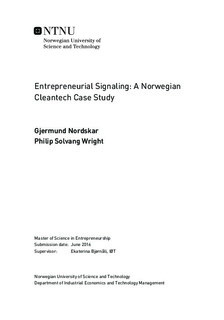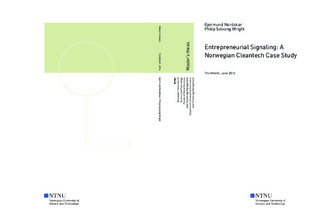| dc.description.abstract | Mitigating climate change is one of the most pressing issues of today, and critical for the future of our planet. As an effort to find solutions to mitigate the climate change, new cleantech ventures develop new innovative and environmentally friendly technology. Reaching important entrepreneurial milestones, such as first investment or getting the first pilot customer may be decisive whether a cleantech start-up survives and grows or not. In order to reach such milestones and overcoming the liability of newness, the start-ups must signal own qualities and intentions to convince potential investors, customers and important strategic partners. These signals may be information about legitimacy, patents, market share, board members or growth potential. Signaling as a strategy to achieve important milestones in new cleantech ventures is an overlooked research area, even though the general public as well as investors are drawn to their attention.
The purpose of this master thesis is to investigate the signaling process of cleantech start-ups both in the early and in the later growth stage to see if there are any significant differences or similarities. Therefore, the research question was developed as following: How do cleantech start-ups signal to achieve important milestones in different growth stages? . To answer the research question, the research investigated what were the underlying motives for signaling, what kind of signals were sent to which receivers, and how was the signals sent in both stages.
The study starts with a brief review of the most important literature from the entrepreneurship research stream regarding legitimacy, signaling and stage-based theory. Based on the reviewed literature, a conceptual framework is proposed describing and explaining what is expected to be found later in the findings.
Analyzing the findings revealed several interesting aspects of how cleantech start-ups signal towards potential partners. The most significant finding suggests that environmental signals has a greater effect when signaled in the growth stage rather than the early stage. Another finding also suggests that the cleantech start-ups benefit from using their board to signal towards investors, customers and other potential partners, as well as there is a difference in the use of external agents when signaling in the early and the growth stage. | |

